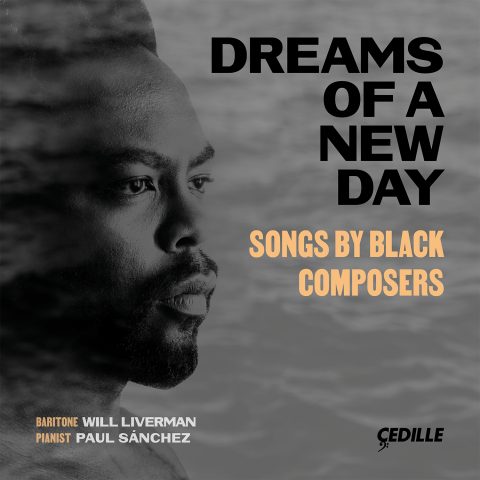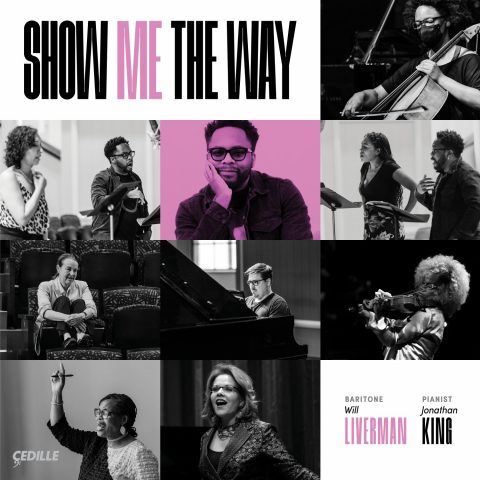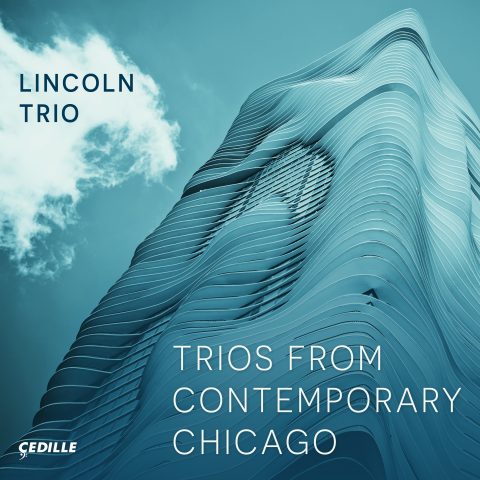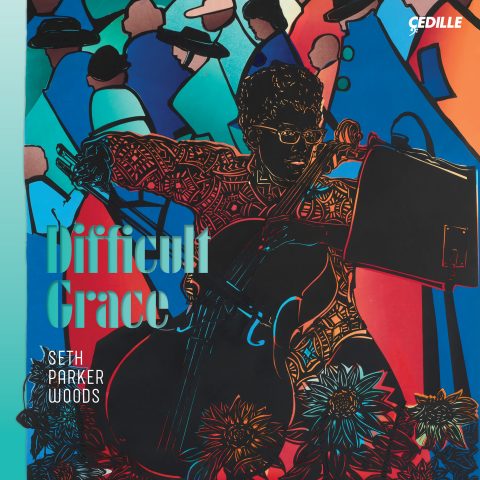| Subtotal | $18.00 |
|---|---|
| Tax | $1.85 |
| Total | $19.85 |
Store
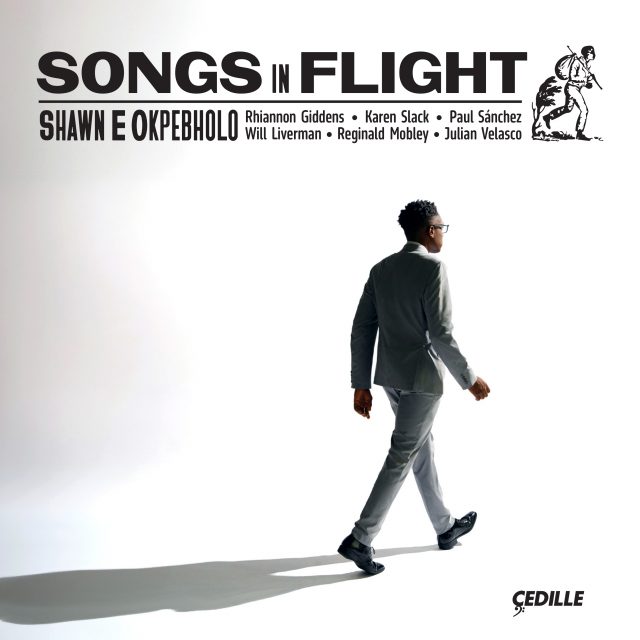
Store
Songs in Flight
Rhiannon Giddens, Will Liverman, Reginald Mobley, Karen Slack, Paul Sánchez, Julian Velasco
Songs in Flight features world premiere recordings of Shawn E. Okpebholo’s complete song cycle for which the album is named, along with four additional art songs — one from each of his other song cycles — building upon the themes and messages of his work, performed by Grammy winning and-nominated artists known for their dedication to cultural and historical music projects.
Drawing inspiration from the Freedom on the Move database of advertisements for runaway enslaved individuals, Songs in Flight explores their untold stories over twelve songs with texts by poets Tsitsi Jaji, Crystal Simone Smith, and Tyehimba Jess. The work incorporates styles including spirituals, folk tunes, elegies, and protest songs, each song offering a unique historical narrative and emotional depth.
A celebrated figure in contemporary classical music, Okpebholo’s music has been described as “devastatingly beautiful” by the Washington Post. Songs in Flight continues his mission to create impactful, narrative-driven music, bringing new dimensions to historical stories.
Performers include Grammy Award-winning multi-instrumentalist, Rhiannon Giddens, celebrated for her work in reviving African American folk traditions; Grammy-winning baritone Will Liverman, praised as a “voice for this historic moment” (Washington Post); Grammy-nominated countertenor Reginald Mobley, renowned for his powerful interpretations across diverse repertoire; Karen Slack, Grammy-winning soprano with a “sizeable voice that captures vacillating emotions” (New York Times); and Grammy-nominated pianist Paul Sánchez, praised as “the ideal interpreter . . . performing with clear virtuosity” (Fanfare). Saxophonist Julian Velasco, winner of Cedille’s inaugural Emerging Artist Competition, joins in two of the songs following the cycle.
Honoring the resilience of historical figures while acknowledging modern-day struggles with racial injustice, including references to Ahmaud Arbery and Trayvon Martin, Okpebholo’s work reclaims the humanity and voice of these people, making their lives and struggles resonate through this intricate, soulful collection of songs.
Songs in Flight was produced by Shawn E. Okpebholo and engineered by Brian Porick. It was recorded March 9–10 and 12–13, 2024 at the Amerding Center for Music and the Arts at Wheaton College.
Songs in Flight is made possible by the generous support of an Anonymous donor; the Robert and Isabelle Bass Foundation, Inc.; the Aaron Copland Fund for Music; Wheaton College Aldeen and Global Research Grants; and the Ruth Bader Ginsburg Fund for Vocal Recordings at Cedille Records, with additional support from Queta and Ron Bauer, Linda and Owen Youngman, Dave Miller, and Maria and Peter Lagios.
Preview Excerpts
SHAWN E OKPEBHOLO (b. 1981)
Songs in Flight
Unknown
Three Psalmic Meditations
Words Like Freedom
Four Songs on Love
Artists
1: Rhiannon Giddens, Paul Sánchez
2: Karen Slack, Will Liverman, Paul Sánchez
3: Reginald Mobley, Karen Slack, Will Liverman, Paul Sánchez
4: Will Liverman, Paul Sánchez
5: Rhiannon Giddens, Paul Sánchez
6: Reginald Mobley, Karen Slack, Will Liverman, Paul Sánchez
7: Karen Slack, Reginald Mobley, Paul Sánchez
8: Karen Slack, Will Liverman
9: Reginald Mobley, Karen Slack, Will Liverman, Paul Sánchez
10: Rhiannon Giddens, Paul Sánchez
11: Karen Slack, Reginald Mobley, Will Liverman, Paul Sánchez
12: Will Liverman, Paul Sánchez
13: Rhiannon Giddens, Julian Velasco, Paul Sánchez
14: Reginald Mobley, Julian Velasco, Paul Sánchez
15: Will Liverman, Paul Sánchez
16: Karen Slack, Paul Sánchez
Program Notes
Download Album BookletPersonal Note
Notes by Shawn E. Okpebholo
In 2021, I received a call from Martha Guth, celebrated soprano and co-director of Sparks & Wiry Cries. She spoke passionately about the Freedom on the Move database, an archive of over 30,000 advertisements for runaway enslaved individuals. Having experienced one of my previous compositions, Martha proposed an ambitious project: an expansive song cycle that would breathe life into these dehumanizing records. The project would include performances at prominent venues and collaborations with world-renowned musicians Rhiannon Giddens, Will Liverman, Reginald Mobley, Karen Slack, and Howard Watkins, alongside lead curator and poet Tsitsi Ella Jaji.
Initially, the weight of the subject matter gave me pause. Having recently completed a challenging work focused on Black suffering, I questioned my capacity to undertake another emotionally demanding project, especially as a composer who invests deeply in the stories I tell. That night, however, I immersed myself in the Freedom on the Move archive. The ads, designed solely to recapture self-liberated individuals, described their physical features, clothing, and mannerisms in chilling detail — yet inadvertently revealed fragments of their stories, offering a glimpse into their humanity. I felt an undeniable pull to reaffirm the dignity and personhood of these lives, whose stories persist in fragments. I said yes and would spend the next year composing Songs in Flight, alongside extraordinary collaborators, including multiple Pulitzer Prize- and Grammy-winning and -nominated artists whose artistry and dedication infused the work with incredible depth.
Witnessing the impact of this work on audiences nationwide has been profoundly
moving. Now, with this album release, the reach of these narratives will extend even further. The album includes Songs in Flight alongside four additional art songs — one from each of my other song cycles — building upon the themes and messages of the project. The album cover juxtaposes an archival image of a self-emancipated individual with a photo of myself, both figures in motion, with me following. This imagery suggests an ongoing journey toward freedom that remains unfinished. My shadow looms, symbolic of the self-liberated who hid among the shadows, and the enduring shadow of slavery — a reminder that, while unshackled, its trauma lingers. The cycle connects past and present, with references to Trayvon Martin and Ahmaud Arbery, tracing an unbroken line from historical atrocities to today’s racial violence. Yet, woven throughout, there are glimpses of hope.
This album is the result of an incredible village. My deepest gratitude goes to Martha Guth, whose boundless vision and dedication made Songs in Flight a reality; to the phenomenal artists listed above who brought this work to life in unimaginable ways, including pianist Paul Sánchez and saxophonist Julian Velasco; and to poets Tsitsi Ella Jaji, Crystal Simone Smith, Tyehimba Jess, Marcus Amaker, and Beatrice Holz, whose affecting words lie at the heart of these songs; to recording engineer Brian Porick, a true creative partner, for his masterful work; and to Jim Ginsburg, president of Cedille Records, for his unwavering support, invaluable guidance, and for allowing me the creative freedom to produce this album for his esteemed label.
I’m also grateful to Sparks & Wiry Cries, MetLiveArts (Metropolitan Museum of Art), the Philadelphia Chamber Music Society, and Wheaton College for creating space to tell these stories, paving the way for this album. To Ed Baptist, Jeremy Botts, Nathan Miller, Shericka Smith, and Owen Summers, who provided invaluable insights: thank you. Finally, my heartfelt appreciation goes to the generous patrons, imaginative designers, and devoted Cedille Records team. And to my wife, Dorthy, and our daughters, Eva and Corinne — you are the reason I write. You remind me daily of the power of hope, legacy, and love.
Program Note
Notes by Tsitsi Ella Jaji
How will we format history? Songs in Flight ponders this question by imagining the voices of people who dared to liberate themselves by running away from their enslavers in the 18th and 19th centuries. The song cycle draws upon Freedom on the Move, a Cornell University archived database of over 30,000 newspaper
advertisements assembled by a team of university historians. In these macabre lost and found ads, enslavers would offer a reward for the recapture of persons who had fled captivity in pursuit of liberty. Jail wardens who apprehended escapees also summoned enslavers to reclaim the people they considered property. Freedom on the Move presents these instruments of systematic cruelty designed to control the movement of enslaved people as miniature portraits of people who had no other way to enter the historical record. The advertisements are brief but detailed descriptions of the personality, appearance, and life story of individuals who found the wherewithal to emancipate themselves for however long they could evade recapture. Taken collectively, the ads constitute a detailed, concise, and rare source of information about the experiences of enslaved people.
For centuries, Black people were bought and sold like wagon wheels. The statistics of the transatlantic slave trade are staggering: 12 million people left the coast of Africa in chains, of whom an estimated two million perished in the Atlantic Ocean. But in a world where we are constantly barraged by data, media, and content, it is all too easy to hurry past history, and to miss the ways in which, as William Faulkner wrote, the “past is never dead. It’s not even past.”
Songs in Flight makes us listen to history with more care. Art song is an intimate form, and the extraordinary singers on this album bare emotion in performances that display the human voice’s capacity to bear the color and grain of interior worlds to contemporary audiences, a true musical offering. The 12 songs that make up the song cycle begin with Okpebholo’s fearless setting of the spiritual “O, Freedom,” first heard on Okpebholo’s 2015 album of spirituals, Steal Away. Here, it is Rhiannon Giddens who performs, ushering us into a place of somber reflection as she sings in the richly-textured nether end of her range, while Paul Sánchez trudges through the depths of a dark, muddy, piano ostinato that refuses sentimentality. The sound seems to say that the true meaning of hope lies in the capacity to strive toward the end of suffering, even when there is no sign of a brighter horizon ahead.
In the second song, Karen Slack’s “In Flight,” we hear how the perspective of a lyricist charged with writing about slavery speaks to the dilemma artists confront when facing the long and shameful enterprise that made modernity possible. The song evokes the first search poet Tsitsi Ella Jaji made in the Freedom on the Move database. Having entered a single parameter, “female,” the poet finds Phebe, a young woman described in remarkable detail. The smudged scan of old newsprint displays how enslavers knew very well that the people considered “chattel” property lead complex interior lives. The advertisement alludes to how Phebe preferred to wear her hair, the particular care she took over her dress, and facial scars — perhaps from acne, perhaps from the searing burn of a branding iron. As with the entire cycle, this song grapples with how choosing from thousands of advertisements echoes with the act of selecting people to purchase in the slave markets from Rhode Island to Georgia (and beyond). Mitigating the risk of sentimentalizing these stories, Okpebholo ensures that the brutal data in the advertisements remains present by setting their full text, whether as narrations, solos, or ensembles, to punctuate the cycle.
The clearest portraits of fugitives come in Crystal Simone Smith’s four poems, which draw out the most essential details of the advertisements. Each is a sequence of haiku — an ancient Japanese form that makes a virtue out of sparseness. Consider the song of Asko, or maybe Glasgow, or something like that. Echoing oppression in our contemporary moment, the advertiser can’t be bothered to “say his name.” Smith’s artistry melds beautifully with Okpebholo’s. The lyric “back marked by the whip’s lick” conveys how quotidian the violence of slavery was — scars simply a descriptor — and his scoring for countertenor Reginald Mobley evokes the vocal register of a little boy — age ten, barely four feet tall. Reasoning from the historic descriptor of “yellow” skin that Peter may have suffered perpetual sunburn, she adds an imaginative leap: his denunciation of an enslaver who, like so many, justified the system with scripture. What drives each person to risk unspeakable punishment if recaptured? What could a Jack or Paul hear through their jail windows? What depravities could a Mariah Frances suffer, trapped in close quarters with a man who would face no consequences for serial assault? The economy of words in haiku grants privacy to individuals who had no autonomy over their own bodies, except as exerted when they ran away.
Okpebholo’s beautiful neo-folk tune, “Mud Song” and breathless duet, “Matilda’s Tom” move through the wetlands where fugitives eluded tracking dogs. “Mud Song” evokes the parallel indigenous American and African knowledge systems, with a refrain drawn from the Akan proverb about a crocodile’s adaptability, recalling how maroons and Native Americans navigated marshlands. Mobley’s virtuosic melismas bring the best of gospel and Motown into the room with the jaunty insistence of a man, referenced in an ad as “Bob,” that he goes “by Robert.” Jaji’s other two lyrics in Songs in Flight are dedicated to the families of Ahmaud Arbery and Trayvon Martin. Throughout the Freedom on the Move database, names and places offer a sobering reminder that liberation remains ongoing. An advertisement placed by a Zimmerman in the database triggers memories of the 2015 death of Trayvon Martin, while Shadrack McMichael’s ad was published not far from the Georgia county where two other McMichaels gunned down jogger Ahmaud Arbery in 2020. For Black people, running outdoors has always been fraught. Giddens sings “Ahmaud” with the devasting tenderness of a mother’s love, while Okpebholo’s quotation from the spiritual “Deep River” is a testimony to how these songs have sustained generations of Black Americans. “Four Martins,” the most intense piece on the album, really goes there. The name Martin appears across the database as a first name, a surname, and even an alias. In an ensemble piece, Okpebholo interweaves four different advertisements that allude to what each Martin was wearing, carrying, or following. As with many advertisements, one notes that the fugitive is suspected of fleeing in search of a parent. The pain of such history recurring is hammered out in the unflinching repetition of a vocal cluster chord indicting the justice system that let George Zimmerman go “scot-free” after killing Trayvon Martin. Mercifully, the song cycle does not end there, but in a lyrical setting of Pulitzer Prize-winner Tyehimba Jess’s poem about one of the original Fisk Jubilee Singers, Thomas Rutling. In his performance, Will Liverman leaves us floating at the exquisite apex of his range as Rutling clings to the strength his mother taught him in the spiritual “Swing Low,” her last gift as they were forced apart.
Complementing Songs in Flight, the album introduces us to four more Okpebholo song cycles with a selection from each. As a man of deep faith, he breathes life into poems by his frequent collaborator, Marcus Amaker; a former teacher, Beatrice Holz; Langston Hughes; and scripture. These songs evoke war, time, strength, and love to meditate on the moral and biological frailty of humankind. May these songs soar as a monument to those who sacrificed so much in pursuing freedom, and as a clarion call for us to join that cloud of witnesses.
Tsitsi Ella Jaji is the author of the poetry collections Mother Tongues and Beating the Graves, and Africa in Stereo: Music, Modernism and Pan-African Solidarity.
Album Details
Producer Shawn E Okpebholo
Engineer Brian Porick
Recorded
March 9–10 and 12–13, 2024
Armerding Center for Music and the Arts at Wheaton College
Publishers
Songs in Flight © 2022
An Echo, an Ending (from Unknown) © 2021 • transcription © 2023
Time (from Three Psalmic Meditations) © 2019 • transcription © 2023
Sing, O Black Mother (from Words Like Freedom) © 2020
I’m Sure (from Four Songs on Love) © 2012 • transcription © 2024
All works published by Yellow Einstein Press
Cover Photo Elliot Mandel
Images
Advertisements along with the corresponding crowdsourced data is provided free of charge by the Freedom on the Move Project, and is licensed under Creative Commons BY-NC-SA 4.0. freedomonthemove.org
Graphic Design Bark Design
CDR 90000 234
